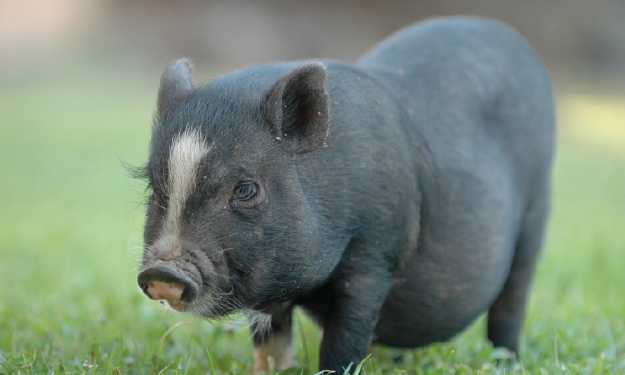Vaccines for Pot-Bellied Pigs

Written by Mike Corcoran, DVM, DABVP (R/A) CertAqV
Vaccines are an important part in prevention of disease for your pet pig. Your pet’s vaccines are determined on an individual basis based on individual needs, but in general we recommend the following:
Parapleuro Shield
Parapleuro Shield is a combination vaccine that covers for several of the most common and most concerning diseases in pigs. It is given as a series of 2 shots initially, then boostered annually for protection. It specifically offers protection from the following:
- Actinobacillus pleuropneumoniae serotypes 1, 5 & 7: Respiratory disease
- Bordetella bronchiseptica: Respiratory disease
- Erysipelothrix rhusiopathiae: “Diamond Skin Disease” bacterial disease that can be very quickly fatal, can evolve into a chronic disease and may spread to humans (less severe disease in humans)
- Haemophilus parasuis: Glasser’s Disease: Can cause respiratory disease, polyarthritis and meningitis. Can be fatal
- Pasteurella multocida type A: Pneumonia
Leptospirosis
Leptospirosis is a disease that can be found in any standing water outside. It is very common in his area and is spread through urine from local wildlife. The vaccine offers protection from 5 different strains of this disease. It is given as a series of 2 shots initially, then boostered annually for protection.
Tetanus
Pigs are very prone to tetanus and it can be fatal. Tetanus toxoid is given as a series of 2 shots initially, then boostered annually for protection.
Rabies
Rabies is found in many wild animals in the Northeast. Rabies vaccine can be given to pigs, and likely helps provide protection from this disease that is fatal to mammals (including humans). It is very important to note that there is no rabies vaccine that is tested and approved for use in pigs, so we will be unable to issue a rabies certificate for your pet. In the event your pig is bitten by a wild animal or bites a human, quarantine is up to local authorities. Since the vaccine is not approved, your pig will never legally be considered vaccinated, but it may be taken into consideration when outlining quarantine restrictions by some officials.